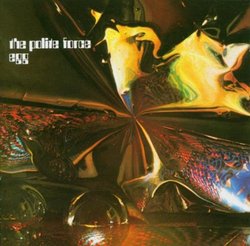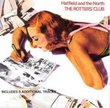| All Artists: Egg Title: Polite Force (Reis) Members Wishing: 4 Total Copies: 0 Label: Eclectic Discs Release Date: 2/15/2005 Album Type: Import, Original recording remastered Genres: Pop, Rock Styles: Progressive, Progressive Rock Number of Discs: 1 SwapaCD Credits: 1 |
Search - Egg :: Polite Force (Reis)
 | Egg Polite Force (Reis) Genres: Pop, Rock
UK reissue of sophomore album, originally issued in 1971, from the British progressive rock act favorably compared to Emerson, Lake & Palmer. A must for all art rock fanatics. Eclectic. 2004. |
Larger Image |
CD DetailsSynopsis
Album Description UK reissue of sophomore album, originally issued in 1971, from the British progressive rock act favorably compared to Emerson, Lake & Palmer. A must for all art rock fanatics. Eclectic. 2004. Similar CDs
|
CD ReviewsOutstanding Progressive Rock DigitalMan | New York | 12/04/2005 (5 out of 5 stars) "This superb CD ranks up there as one of the finest. For my tastes, it is the best of the three excellent albums recorded and released by Egg. Please forgive the comparison to Emerson Lake and Palmer (another progressive keyboards, bass, drums trio), but whereas they could be bombastic and pompous in their music, Egg managed to say what they needed to more subtly and with far richer complex melodies carried by Dave Stewart's always beautiful and unique sounding organ. I highly recommend this superb CD, and it is nice that it is finally available beyond the expensive Japanese import - formerly the only way to buy it." A Shining Star of a Golden Era! Jose Artiles-Gil | Santo Domingo, Dominican Republic | 04/01/2006 (5 out of 5 stars) "One has to agree with those who say that in the music industry the Darwinist law of "natural selection" reigns; otherwise, one could not explain why so much good music was thrown into oblivion. Fortunetly, the emergence of the cd format constituted a second chance for some of this good music be considered again. This is the case of Egg, one of the most overlooked band of the early seventies, but with a talent quite comparable to those that fared better commercially, for example, "Emerson, Lake and Palmer", with whom Egg is often compared, although for me each one is quite distinct in spite of being both a keyboard, bass and drum trio, and of both being prone to quote classic music passages. For one thing, Egg has a stronger leaning toward contemporary avant garde music and modern jazz than ELP; on the other hand, they were not as bombastic as ELP were, although they show as good musicianship as ELP's. Anyway, comparing Egg's music, comprised in just three albums, to ELP, who had the opportunity of developing a much larger catalog seems to me a little unfair to both, excellent bands as they were but with different fortunes. Having said that, the second Egg's album (Dave Stewart on keyboards, Mont Campbell on Bass, and Clive Brooks on drums), "The Polite Force" is a more than polite show of musical force, beginning with two pieces sung by bassist Mont Campbell, the first notably executed at the level of the interplay between bass, keyboard and drums, and the second, not less well executed but shorter, with the addition of brass arrangements performed by two tenor saxes and two trumpets. And then the two major pieces of this disc follow: the excellent noise-electronic-classic piece called Boilk, which reminded me Pink Floyd's Saucerful of Secrets; and finaly the Long Piece No.3, a gem of progressive/classical/jazz inspired piece of work. Definetly this disc is a shining star of a Golden Era of music. Thanks to the cd industry, Dinosaurs are walking on Earth again!" GREAT ALBUM, SO WHY NO EXTRA'S? M. Harris | BRIGHTON, EAST SUSSEX United Kingdom | 03/10/2006 (4 out of 5 stars) "This is almost as good as the masterful first album. Egg were truely progressive with weird time signatures, great arrangements and exemplary musicianship. While others bands playing this sort of stuff try to be as advant garde as possible (Henry cow) Egg at least were always accesible. Whenever i hear Dave Stewarts hammond work i just know it is him (check out his work on the Robert Wyatt live album) just like Mike Ratledge and Dave Sinclair his is a totally unique style and Mont Campbell is one of the great singers, powerful and emotive and a great lyricists, witty and very clever. His words to the majestic 'a visit to Newport Hospital' are brilliant and poignant and deliver with great gusto. As for the foremention track this encapulates everything good about the band. A heavy dirge like intro before going into its beautiful main theme and when the solo comes in wow-this is what made early English prog so i unique. The next track 'contraband' is way to short. Brilliant singing from Mont (he really should of sung more!) and lyrics over an incredible complex riff and a great horn solo-superb. Then they f++k it up big time on 'boilk' nine minutes of noise. There is a Bach theme incorperated but i can't find it. What a waste of time. There is no pulse throughout. Pointless. Thankfully 'long piece' is a lengthy classic in the mode of the suite on the first album. Once again consistently interesting and complex 'part 2' is beautiful. So why no extra's? Surprisingly live the band kept it pretty much straight with little improvisation (witness the 'radio 1' bootleg tapes i've heard) but an omission is the wonderful early version of 'germ patrol' which was far, far better than the lacklustre 'civil surface' version. Why didn't they put that on the end. It's a startling omission for such a great performance and why not put on the live T.V clip from 1970 (now i'm being silly!) I once spoke to Clive Brookes at a Groundhogs gig and raved about Egg. He looked surprised that i'd heard of them 'That was a long time ago' he said. It was, but it's still as great now, as it was then. Top notch stuff!"
|

 Track Listings (4) - Disc #1
Track Listings (4) - Disc #1